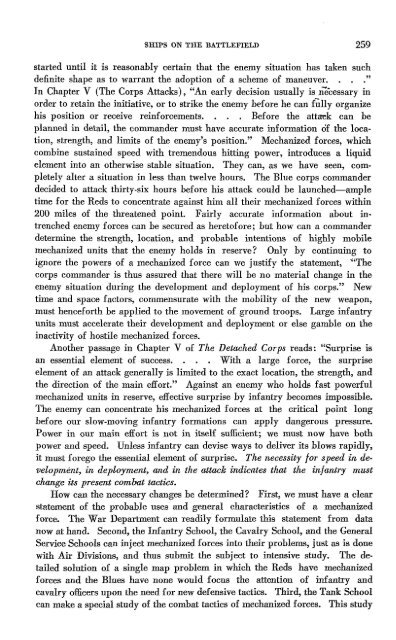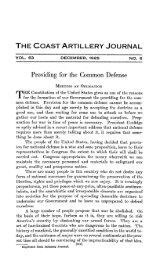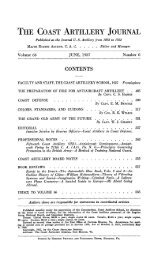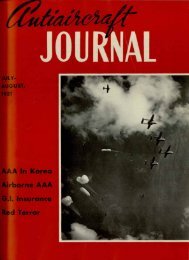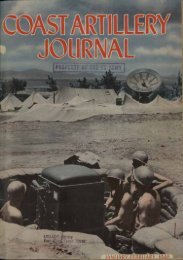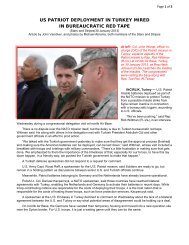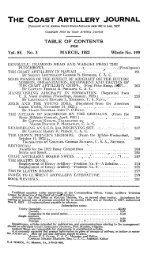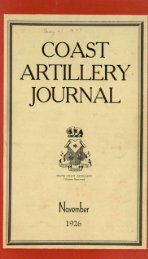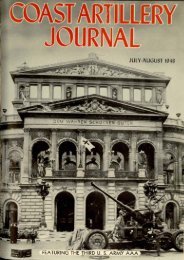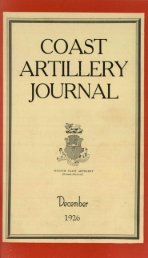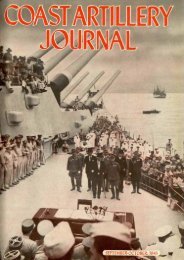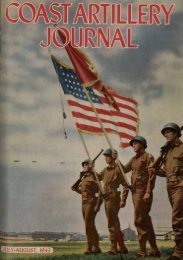THE COAST ARTILLERY JOURNAL - Air Defense Artillery
THE COAST ARTILLERY JOURNAL - Air Defense Artillery
THE COAST ARTILLERY JOURNAL - Air Defense Artillery
You also want an ePaper? Increase the reach of your titles
YUMPU automatically turns print PDFs into web optimized ePapers that Google loves.
SHIPS ON <strong>THE</strong> BATTLEFIELD 259<br />
started until it is reasonably certain that the enemy situation has taken such<br />
definite shape as to warrant the adoption of a scheme of maneuver. "<br />
In Chapter V (The Corps Attacks), "An early decision usually is necessary in<br />
order to retain the initiative, or to strike the enemy before he can fully organize<br />
his position or receive reinforcements. Before the attack can be<br />
planned in detail, the commander must have accurate information cif the location,<br />
strength, and limits of the enemy's position." Mechanized forces, which<br />
combine sustained speed with tremendous hitting power, introduces a liquid<br />
element into an otherwise stable situation. They can, as we have seen, completely<br />
alter a situation in less than twelve hours. The Blue corps commander<br />
decided to attack thirty-six hours before his attack could be launched-ample<br />
time for the Reds to concentrate against him all their mechanized forces within<br />
200 miles of the threatened point. Fairly accurate information about intrenched<br />
enemy forces can be secured as heretofore; but how can a commander<br />
determine the strength, location, and probable intentions of highly mobile<br />
mechanized units that the enemy holds in reserve? Only by continuing to<br />
ignore the powers of a mechanized force can we justify the statement, ""The<br />
corps commander is thus assured that there will be no material change in the<br />
enemy situation during the development and deployment of his corps." New<br />
time and space factors, commensurate with the mobility of the new weapon,<br />
must henceforth be applied to the movement of ground troops. Large infantry<br />
units must accelerate their development and deployment or else gamble on the<br />
inactivity of hostile mechanized forces.<br />
Another passage in Chapter V of The Detached Corps reads: "Surprise is<br />
an essential element of success. With a large force, the surprise<br />
element of an attack generally is limited to the exact location, the strength, and<br />
the direction of the main effort." Against an enemy who holds fast powerful<br />
mechanized units in reserve, effective surprise by infantry becomes impossible.<br />
The enemy can concentrate his mechanized forces at the critical point long<br />
before our slow-moving infantry formations can apply dangerous pressure.<br />
Power in our main effort is not in itself sufficient; we must now have both<br />
power and speed. Unless infantry can devise ways to deliver its blows rapidly,<br />
it must forego the essential element of surprise. The necessity for speed in developmimt,<br />
in deployment, and in the attack indicates that the infantry must<br />
change its present combat tactics.<br />
How can the necessary changes be determined? First, we must have a clear<br />
statement of the probable uses and general characteristics of a mechanized<br />
force. The War Department can readily formulate this statement from data<br />
now at hand. Second, the Infantry School, the Cavalry School, and the General<br />
Service Schools can inject mechanized forces into their problems, just as is done<br />
with <strong>Air</strong> Divisions, and thus submit the subject to intensive study. The detailed<br />
solntion of a single map problem in which the Reds have mechanized<br />
forces and the Blues have none would focus the attention of infantry and<br />
cavalry officersupon the need for new defensive tactics. Third, the Tank School<br />
can make a special study of the combat tactics of mechanized forces. This study


